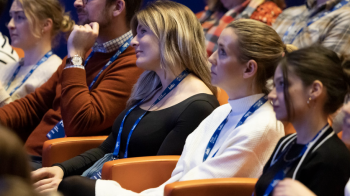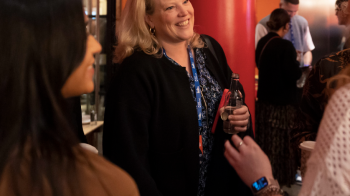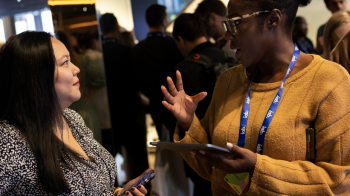Hilary Benn MP: “You need to sustain good quality journalism that can be trusted”
Posted on Thursday 28 September 2023 | IAB UK
Read key takeaways from our third regional roundtable, hosted in Leeds with Hilary Benn MP, which focused on how digital advertising can better support small businesses and local media
“60% of SMEs in this country are investing in paid-for digital advertising, which rises to 81% for businesses with between 10-49 employees” explained our Chief Industry Officer, Tim Elkington, opening our third regional roundtable - hosted in Leeds - with MPs, local press and business leaders.
The ensuing discussion touched on a wide range of issues, from the need to build public trust in news content, to ways that local media outlets can effectively monetise their content and services while still delivering a high-quality user experience. Attendees also highlighted the need for business representative organisations, industry and trade bodies to come together to share resources to support small business to understand and make best use of digital advertising opportunities.
In attendance: Barney Mynott, Development Manager, Federation of Small Businesses; Christie Dennehy-Neil, Head of Policy and Regulatory Affairs, IAB UK; Hilary Benn MP, Labour Member of Parliament for Leeds Central and Shadow Secretary of State for Northern Ireland; Councillor James Lewis, Leader of Leeds City Council; James Mason, CEO, West and North Yorks Chamber of Commerce; John Baron, Editor, West Leeds Dispatch; Mark Casci, Head of Policy and Representation, West and North Yorkshire Chamber of Commerce; Tom Austin, Head of B2B Sales, Reach; Tim Elkington, Chief Industry Officer, IAB UK; and Wayne Ankers, Editor, Yorkshire Live and Leeds Live.
Key points raised included:
Educating SMEs about digital advertising
“What can we do to support small businesses in the current economic climate?” asked Lewis, with Benn also questioning where SMEs can get help with digital marketing. As Mynott explained, support does exist but the challenge lies in making sure people know where to find it. Elkington pointed to the IAB’s interactive online tool for SMEs - which is free to use and allows small businesses to access a range of tailored advice and guidance about digital advertising - and also acknowledged that communicating where support can be found is “something we all need to get better at”.
Monetising local media effectively
A core subject on the agenda was how to effectively monetise local media online without negatively impacting people’s experience of a website by hosting too many and/or intrusive ads. Austin said that “there is an issue in terms of readability and user experience” but that local news outlets are also fighting to stay in business. Meanwhile, Baron shared an example of how the West Leeds Dispatch has built a business model based on social value - training up local people as community reporters and “connecting people to what’s going on in their community on a really local level.” The discussion also touched on different ways that news content can be monteised via ads at a local level, with the Dispatch partially funded via partnership deals with small businesses who pay for a set package of advertorials.
Digital’s role in building local communities & businesses
Examples of how digital channels are helping to bolster local communities came up throughout the debate. Lewis pointed to a local tripe business that started in Dewsbury market and has used digital advertising to expand - now selling to an international market. Meanwhile, Baron highlighted the social benefits of hyper-local media publications in fostering connections: “They provide that focus that the big outlets can’t any more.”
The fragmentation of media experiences
“When I was born, there were loads and loads of newspapers and one television show”, explained Benn. “There’s been a very big change in a relatively short time and the pace of change is getting faster” which has a number of implications - not least that there are fewer “collective shared experiences” in society. Benn acknowledged that the fragmentation of media “has really big benefits” but also raises stark challenges, such as a fall in newspaper readership and declining trust for mainstream news sources.
Arresting declining trust in media
A proliferation of different news sources has had a real impact on how democracy operates, according to Benn, who pointed to the fact that “70% of republican voters actually believe that Donald Trump won the election” because there is no common source of trusted information. Baron also pointed to a growth in “pack mentality” where people commenting on online articles “don’t like to see opposing views… [and so] try to discredit what you’re writing.” How we “educate ourselves and the next generation to interrogate what you’re looking at” is a current and urgent issue in order to “sustain good quality journalism that can be trusted”, explained Benn.
Related content
Sinead Coogan Jobes joins IAB UK to lead policy & public affairs
Learn moreGovernment issues statement on LHF online ad restrictions
Learn moreOnline Safety Act comes into effect
Learn moreIAB UK to support SMEs in taking their digital ad campaigns to the next level
Learn more
Rediscover the joy of digital advertising
Champion connections instead of clicks. Capture audiences' imaginations, not just their attention. Boldly find your own beat instead of letting tech set the pace. It’s time to rediscover the joy of digital.



